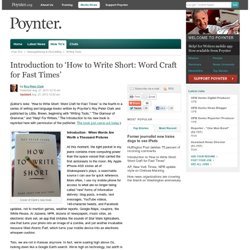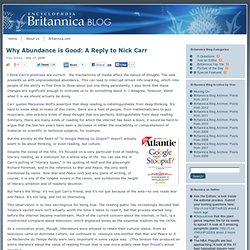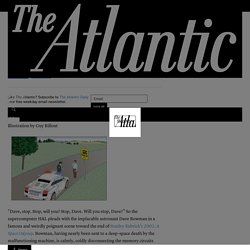

Writing for the Web. Introduction to ‘How to Write Short: Word Craft for Fast Times’ (Editor’s note: “How to Write Short: Word Craft for Fast Times” is the fourth in a series of writing and language books written by Poynter’s Roy Peter Clark and published by Little, Brown, beginning with “Writing Tools,” “The Glamour of Grammar,” and “Help!

For Writers.” The Introduction to his new book is reprinted here with permission of the publisher. The book just came out today.) Cover of Clark’s new book. Introduction: When Words Are Worth a Thousand Pictures At this moment, the right pocket in my jeans contains more computing power than the space vessel that carried the first astronauts to the moon. Toto, we are not in Kansas anymore. I’ve written “How to Write Short” because I could not find another book quite like it and because in the digital age, short writing is king. Example of "Evergreen Content" Picture a cypress-lined road in Tuscany.

Now picture yourself arriving at a 10th-century former castle on more than 4,000 acres of rolling hills. Welcome to Castello di Casole, a new 41-suite hotel that already ranks as No. 2 in the world. We asked our readers to vote in the 18th annual World’s Best Awards for properties like Castello di Casole that have won them over—weighing in on categories such as rooms, location, service, food, and value. The resulting list is not only a go-to hotel resource for planning your next trip, but also reveals the destinations that are important now. One of the most exciting trends is the desire to get off the grid. Luckily, there are plenty of amazing places to stay closer to home.
Whether you’re ready for a nature retreat or eager to pound the pavement of Hong Kong, Berlin, or Beverly Hills, there’s a property for you among the World’s Best Hotel winners. —Jennifer Flowers. Multitasking. The Internet and Concentration. Selective Inattention. Selective attention test. Why Abundance is Good: A Reply to Nick Carr. I think Carr’s premises are correct: the mechanisms of media affect the nature of thought.

The web presents us with unprecedented abundance. This can lead to interrupt-driven info-snacking, which robs people of the ability to find time to think about just one thing persistently. I also think that these changes are significant enough to motivate us to do something about it. I disagree, however, about what it is we should actually be doing. Carr quotes Maryanne Wolf‘s assertion that deep reading is indistinguishable from deep thinking. But the anxiety at the heart of “Is Google Making Us Stupid?” Despite the sweep of the title, it’s focused on a very particular kind of reading, literary reading, as a metonym for a whole way of life. But here’s the thing: it’s not just Carr’s friend, and it’s not just because of the web—no one reads War and Peace.
This observation is no less sacrilegious for being true. And now the internet has brought reading back as an activity. Shirky's Response. Clay Shirky - Internet & Government. Why Skepticism is Good: My Reply to Clay Shirky. Clay Shirky begins by agreeing with the main thrust of my essay: that our intellectual technologies influence the way we think, and that the Web, in his words, “can lead to interrupt-driven info-snacking, which robs people of the ability to find time to think about just one thing persistently.”

It’s not just a matter of “finding time” to think deeply, though. What the Net may be doing, I argue, is rewiring the neural circuitry of our brains in a way that diminishes our capacity for concentration, reflection, and contemplation. Carr's Argument. Information Overload...A "Carr-inite" The Pace of Modern Life. Is Google Making Us Stupid? - Nicholas Carr.
Illustration by Guy Billout "Dave, stop.

Stop, will you? Stop, Dave. Will you stop, Dave?” So the supercomputer HAL pleads with the implacable astronaut Dave Bowman in a famous and weirdly poignant scene toward the end of Stanley Kubrick’s 2001: A Space Odyssey. I can feel it, too. I think I know what’s going on. For me, as for others, the Net is becoming a universal medium, the conduit for most of the information that flows through my eyes and ears and into my mind. I’m not the only one. Bruce Friedman, who blogs regularly about the use of computers in medicine, also has described how the Internet has altered his mental habits.
Anecdotes alone don’t prove much. It is clear that users are not reading online in the traditional sense; indeed there are signs that new forms of “reading” are emerging as users “power browse” horizontally through titles, contents pages and abstracts going for quick wins. Reading, explains Wolf, is not an instinctive skill for human beings. Also see: